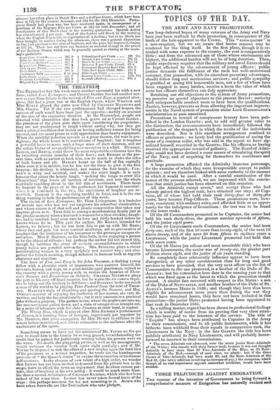TOPICS OF THE DAY.
THE ARMY AND NAVY PROMOTIONS.
THE long-deferred hopes of many veterans of the Army and Navy have just been realized by their promotion, in consequence of the birth of the heir-apparent to the Crown. This " consequence " is a non-sequitur, but we are aware that better reasons may be rendered for the thing itself. In the first place, though it is at- tended with some expense to the country, the cost is comparatively little ; and from the advanced age of those whose emoluments are highest, the additional burden will not be of long duration. Then,. public expediency requires that the military and naval forces should be kept efficient by the advancement of young officers : public justice demands the fulfilment of the tacit but well-understood, compact, that promotion, with its attendant pecuniary advantages, should follow long and meritorious services ; and public sympathy is gratified at seeing 864 honourable men, not a few of whom have been engaged in many battles, receive a boon the value of which none but officers themselves can duly appreciate.
Retaining our old objections to the system of Army promotions, we perceive no special objections to the present Brevet : seniority with unimpeachable conduct seem to have been the qualifications. Justice, however, prevents us from allowing the important improve- ments in the Naval system of promotion under Lord Ilinniainwox's administration to pass unnoticed.
Promotions in reward of conspicuous bravery have been pub- lished in the London Gazette ; and, to add still greater value to the distinction, the announcements have immediately followed the publication of the despatch in which the merits of the individuals were described. Nor is this excellent arrangement confined to officers or gentlemen : we lately had the gratification of seeing the name of a common sailor, who was said in the report to have sig- nalized himself, recorded in the Gazette, like his officers, as having received the appropriate reward of gallantry. The Board of Admi- ralty could not have devised a surer means of stimulating the spirit of the Navy, and of acquiring for themselves its confidence and gratitude.
A large promotion afforded the Admiralty immense patronage, for the exercise of which they were irresponsible except to public opinion ; and we therefore looked with some curiosity to the manner in which it would be used. After a careful examination of the names of the persons selected, we are impressed with the convic- tion that strict justice has been observed on this occasion.
All the Admirals except seven,* and except those who had already gained the highest rank, have obtained one step ; 40 Cap- tains, all of whom had held their rank thirty-four or thirty-five years, have become Flag-Officers. These promotions were, how- ever, consistent with ordinary rules, and afforded little or no oppor- tunity for the indulgence of favouritism : the test was to be found in the lower ranks.
Of the 50 Commanders promoted to be Captains, the senior had held his rank thirty-three, the greater number upwards of AfZeen, and the junior eight years.
Of the 80 Lieutenants made Commanders, the senior had been
forty-one, each of the first 10 more than twenty-eight, of the next 10 above twenty, and of the next 20 from fifteen to eighteen years a Lieutenant, while the junior Lieutenant promoted had held that rank se-ven years.
Of the 80 Mates (an odious and most unsuitable title) who have become Lieutenants, the senior was of twenty-six, the greater part of them above eight, and the junior of st:z years standing.
So completely does aristocratic influence appear to have been
disregarded, or any other consideration than for long and good services to have prevailed, that the very next officer on the list of - Commanders to the one promoted, is a brother of the Duke of Sr. Ammar's; but his commission bore date in the ensuing year to that which was fixed upon as the latest to which the promotion should extend. A similar fact occurred with respect to the Mates : a son . of the Duke of NEWCASTLE, and another brother of the Duke of ST.. ALBAN'S, became Mates in 1836; and though they have thus been eligible for advancement more years than during the war they would have remained hours, they have not been included in this- promotion—the junior Mates promoted having been appointed to that rank in December 1835.
In a trifling matter, regard has been shown to professional feelings- which is worthy of notice from its proving that very close atten- tion has been paid to the interests of the service. The title of "Esquire" has always been attributed to Captains in the Army in their commissions, and in all public instruments, while it has hitherto been withheld from their equals in comparative rank, the Lieutenants in the Navy : in the late Gazette the title has been publicly attributed to Navy Lieutenants, and will probably hence- forward be inserted in their commissions.
• The seven Admirals not advanced, were the seven junior Rear-Admirals of the White; who remain with their former rank., because it was not thought desirable to have more than 20 Vice-Admirals of the Blue, or 33 Rear- Admirals of the Rcd,—enongh of each class, we admit : but if the three classes of Vice-Admirals had been made 20, and the Rear-Admirals of the Red 38, (the latter addition involving no increase of pay,) the exception, which though of no real importance appears somewhat invidious, would have been avoided.


























 Previous page
Previous page